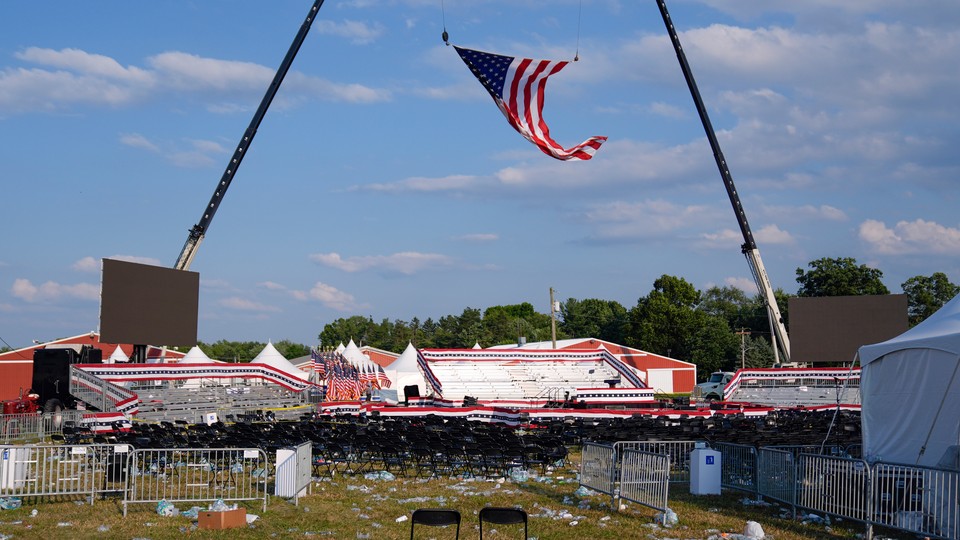The Worst Is Not Foreordained
4 min read
After the wounding of Donald Trump, funeral orations for our democracy appeared everywhere on social media. I feel the gravitational pull of that despair: We are a profoundly polarized people and too many of our leaders—not least the presidential candidate who narrowly sidestepped death in Pennsylvania—have grown accustomed to using threats of violence and death as rhetorical devices.
We swap primal nightmares. Some right-wing Republicans portray President Joe Biden as a senescent totalitarian capable of ordering an assassination. Some prominent liberals invoke fascism’s specter in an off-hand fashion. The New Republic’s decision to caricature Trump as Adolf Hitler on its cover leaps to mind as particularly juvenile.
And yet democracy is not a creature easily slain. We have been this way before and have proved ourselves stronger than our worst imaginings.
To thoroughly date myself, I was a kid during the terrible spring of 1968, when the nation’s greatest civil rights leader, Martin Luther King Jr., was assassinated as he stood on the balcony of the Lorraine Motel in Memphis. Two months later, Robert F. Kennedy Jr. was shot and killed on the evening of his great electoral triumph in the California presidential primary. Dr. King’s death sparked a terrible wind of riot and destruction. U Street, the “Black Broadway” of Washington, D.C., saw its businesses and clubs set afire like so many bonfires. I remember lifting a copy of Life magazine off my parents’ coffee table and gaping at the black-and-white photo of sandbags piled high at the Capitol, National Guardsmen crouched behind with their rifles.
I recall my mother’s passionate, at times family-rending arguments with my Republican relatives in Michigan over civil rights, over the war in Vietnam. My family lived at the time in a conservative suburb of Boston, and a middle-school friend and I were fond of the righteous business of flashing peace signs at passing cars. Often we got the middle finger in return. One time, a driver braked, and he and his overfed buddy pursued us into the woods before we gave them the slip.
Yet wounded and torn though the nation was, Americans survived. The environmental movement took flower, and racial progress, halting but insistent, continues to this day. The House and Senate moved to impeach Richard Nixon for his abuses of power, and his party elders signaled that his game was up. I’m aware that to make such arguments is to risk casting myself—improbably, to those who know me—as a daft optimist. But we have survived worse.
From Andrew Jackson to Abraham Lincoln, James Garfield, William McKinley, Theodore Roosevelt, John F. Kennedy, and Ronald Reagan, our presidents have been shot at and in some cases slaughtered. Two would-be assassins tried to kill Gerald Ford. We are a democratic nation rent by violence. Yet with the exception of a cataclysmic civil war fought over slavery—from whose outcome we can derive honor—we have not dissolved. My hometown of New York City offers hope. When King was slain, thousands in their anger and bewilderment poured into the streets of the predominantly Black neighborhoods of Harlem and Bedford Stuyvesant. Mayor John V. Lindsay—a white liberal Republican—walked the streets himself that night. As a wall of mourners came sweeping across 125th Street, he raised his hands and spoke. “I’m sorry,” he declared, referring to King’s assassination, “This is a terrible thing.”
There were many reasons my city did not explode that night, among them the brave activists and organizers working its many corners. But Lindsay and his courage and willingness to summon a common weal surely helped.
We will hear more dark murmurings now: from Republicans who claim conspiracy and a Secret Service intentionally looking away, from a Democratic strategist who argued that the shooting of Trump might have been staged, a false-flag operation. Were we not living a horror now, such talk might sound almost comical. To suggest that a 20 year-old with a rifle was capable, at 400 feet, of nicking Trump’s ear while missing his cranium is preposterous.
We hear voices of salve and hope, and of anger and division. Which we heed and which we ignore will determine how we and our democracy weather this pass. The worst is not foreordained.



